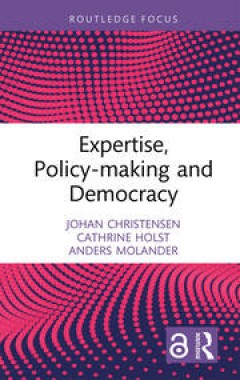Filter by
The politics of coalition in Korea: between institutions and culture
This book examines how inter- and intra-party coalition-building affects governability in South Korea. Focusing on the Kim Dae-jung administration (1998-2003) as a case study in the failure of a government to turn electoral success into stable governability, or ability to implement reform policies, the book’s research draws on two bodies of literature which, though focusing on the same depend…
- Edition
- 1st Edition
- ISBN/ISSN
- 9780203821138
- Collation
- -
- Series Title
- -
- Call Number
- -

The Diversity Of Worldviews Among Young Adults
This open access volume features a data-rich portrait of what young adults think about the world. It collects the views of students in higher education from various cultural regions, religious traditions, linguistic groups, and political systems. This will help readers better understand a generation that will soon rise to power and influence. The analysis focuses on 12 countries. These inclu…
- Edition
- 1
- ISBN/ISSN
- 978-3-030-94691-3
- Collation
- -
- Series Title
- -
- Call Number
- XXV, 381

Religious motivation and the origins of Buddhism: a social-psychological expl…
Why did people in North India from the 5th century BC choose to leave the world and join the sect of the Buddha? This is the first book to apply the insights of social psychology in order to understand the religious motivation of the people who constituted the early Buddhist community. It also addresses the more general and theoretically controversial question of how world religions come into b…
- Edition
- -
- ISBN/ISSN
- 9780203994832
- Collation
- -
- Series Title
- -
- Call Number
- -

The Rhaeto-Romance languages
The Rhaeto-Romance languages have been known as such to the linguistic community since the pioneering studies of Ascoli and Gartner over a century ago. There has never been a community of RR speakers based on a common history or polity and the various dialects are mutually unintelligible, but a unity, based on a number of common features, has been advanced. This book is the first general descr…
- Edition
- 1st Edition
- ISBN/ISSN
- 9780203992487
- Collation
- -
- Series Title
- -
- Call Number
- -

Routledge handbook of global land and resource grabbing
Buku pegangan ini memberikan gambaran umum yang mutakhir dan komprehensif tentang perampasan tanah dan sumber daya global. Perampasan tanah dan sumber daya global telah menjadi topik yang semakin menonjol di kalangan akademis, di antara praktisi pembangunan, pendukung hak asasi manusia, dan di arena kebijakan. Buku Pegangan Routledge tentang Perampasan Tanah dan Sumber Daya Global mempertahanka…
- Edition
- -
- ISBN/ISSN
- 9781003080916
- Collation
- 1 online resource (511 Pages)
- Series Title
- -
- Call Number
- 333.31 NEE r

Cyber security politics :socio-technological transformations and political fr…
- Edition
- -
- ISBN/ISSN
- 9781003110224
- Collation
- -
- Series Title
- -
- Call Number
- -
- Edition
- -
- ISBN/ISSN
- 9781003110224
- Collation
- -
- Series Title
- -
- Call Number
- -

„Beyond the Wall”: Game of Thrones aus interdisziplinärer Perspektive
Dieses Open-Access-Buch beleuchtet das Serienphänomen „Game of Thrones“ aus unterschiedlichen wissenschaftlichen Perspektiven: Die rechtswissenschaftliche trifft auf die sprach-, musik-, literatur- und sozialwissenschaftliche, ferner die (kunst-)historische, psychologische und theologische Perspektive. Die Beiträge zeigen auf, dass die Serie reiche Anknüpfungspunkte für die wissenschaft…
- Edition
- 1
- ISBN/ISSN
- 978-3-658-36145-7
- Collation
- -
- Series Title
- -
- Call Number
- XIV, 287

Expertise, Policy-making and Democracy
ABSTRACT This book offers a concise and accessible introduction to debates about expertise, policy-making and democracy. It uniquely combines an overview of recent research on the policy role of experts with discussions in political philosophy and the philosophy of expertise. Starting with the fact that well-functioning democracies require experts and expert knowledge, the book examines two ty…
- Edition
- -
- ISBN/ISSN
- 9781003106555
- Collation
- -
- Series Title
- -
- Call Number
- -

Responsible Procurement
This open access book emphasizes that procuring goods at the expense of the environment and those who live there is no longer acceptable. Fortunately, there is now an unstoppable force, created by a collective of diverse stakeholders, driving the sustainability agenda. A company’s sustainability standards can only truly be as good as those along its entire supply chain. The purpose of this bo…
- Edition
- 1
- ISBN/ISSN
- 978-3-030-98640-7
- Collation
- -
- Series Title
- Management for Professionals
- Call Number
- XXX, 193

Changing transatlantic security relations: do the U.S., EU, and Russia form a…
This new book shows how the idea of a strategic triangle can illuminate the security relationships among the United States, the European Union and Russia in the greater transatlantic sphere. This concept highlights how the relationships among these three actors may, on some issues, be closely related. A central question also follows directly from the use of the notion of the triangle: does t…
- Edition
- 1st Edition
- ISBN/ISSN
- 9780203969564
- Collation
- -
- Series Title
- -
- Call Number
- -
 Computer Science, Information & General Works
Computer Science, Information & General Works  Philosophy & Psychology
Philosophy & Psychology  Religion
Religion  Social Sciences
Social Sciences  Language
Language  Pure Science
Pure Science  Applied Sciences
Applied Sciences  Art & Recreation
Art & Recreation  Literature
Literature  History & Geography
History & Geography